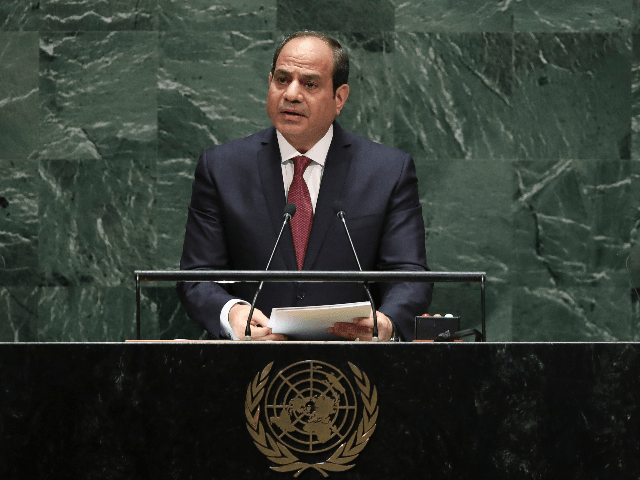Egyptian President Abdel Fatah el-Sisi stressed the importance of developing “national ownership solutions” to regional issues in his address to the U.N. General Assembly on Tuesday.
In practice, this meant both a general call to respect national sovereignty and a specific warning that non-Arab powers should not meddle in the affairs of Arab nations, a warning Sisi repeated in several different contexts throughout his address.
Sisi saluted his administration for embarking upon “an ambitious plan to comprehensively advance society,” including “decisively combating terrorism and launching the most ambitious economic reform in [Egypt’s] modern history.”
He said these reforms were “wholeheartedly embraced by the Egyptian people, who have graciously shouldered the burden of their successful implementation in a manner that exceeded all expectations.”
Reminding the audience that Egypt currently chairs the African Union, Sisi praised the “principle of African solutions to African problems,” a “continent-wide vision that is based on our common history, unity of destiny, and confidence in our ability to achieve progress towards integration and upholding the interests of our peoples.”
Sisi praised initiatives like the African Union Center for Reconstruction and Development and the Aswan Forum for Sustainable Peace and Development as positive steps toward realizing the potential of Africa, but the balance of his speech laid out some problems that have proven painfully resistant to both “African solutions” and U.N. multilateralism, such as the savage civil wars in Yemen and Syria and the utter disintegration of Libya.
In each case, Sisi declared the urgent need for “political” solutions but offered few suggestions for what those solutions would look like.
“I say that the time has come to take a decisive stance to end the protracted crisis in Yemen through the implementation of a political solution based on the well-known parameters,” he said. “We need to end foreign interventions by non-Arab regional parties which seek to curtail Arab national security.”
“We also need to address the unprecedented threats facing the Arabian Gulf region, including threats facing navigation, as well as recent attacks on oil installations in the Kingdom of Saudi Arabia,” he added. Those attacks were the work of Iran, which is also the primary “non-Arab regional party” involved in the Yemeni civil war. Sisi did not call the Iranians out by name.
On the “protracted crisis” in Libya, Sisi said the conflict “needs to be stopped” by taking a “bold and decisive stand to address the root causes of the Libyan crisis comprehensively.”
Sisi said part of this comprehensive solution would involve “addressing the grave imbalance of the distribution of wealth and power, and the absence of public oversight by the Libyan people’s elected representatives over political and economic decision-making.” He decried the influence of local militias and foreign powers on the chaos in Libya.
Sisi called for an equally comprehensive solution to the “longest-standing crisis in the Middle East, namely the Palestinian cause.”
“The persistence of this cause without a just solution based on international resolutions calling for the establishment of an independent Palestinian state with East Jerusalem as its capital does not only mean the continuation of the plight of the Palestinian people, but it also entails the continued depletion of the resources of the peoples of the Middle East,” he said.
“I say that Arabs are open to the realization of a just and comprehensive peace,” he declared. “The Arab peace initiative is still on the table, and there remains an opportunity to launch a new phase in the Middle East. However, we need bold decisions that restore the rights to the Palestinians that pave the way for a major change in the reality of this region.”
Sisi promised that if the Palestinian issue is resolved in this way, it would “lead to the establishment of a security and economic system in the Middle East that is based on peace, security, cooperation, and common interests.”
Sisi stressed the importance of combating terrorism “by confronting all terrorist organizations with no exception” and holding accountable “all those who support terrorism, whether through funding, or whether through weapons, or whether through safe havens or media platforms.”
The Egyptian president called on the United Nations to address the “imbalance in the composition and the shortcomings in the decision-making process” of the U.N. Security Council.
“We must guarantee a balanced representation in the Security Council, and with regard to our African continent, we must work to rectify the historical injustice our continent has been subject to,” he said.

COMMENTS
Please let us know if you're having issues with commenting.